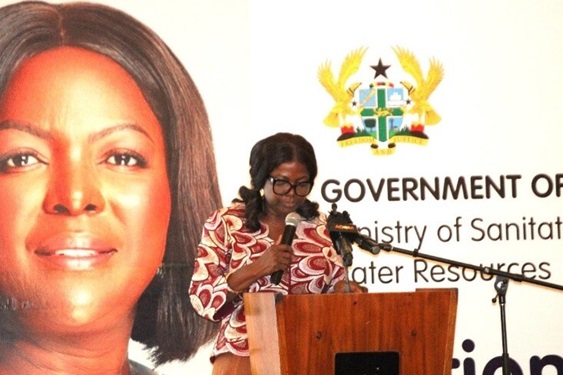Sanitation Minister Lydia Seyram Alhassan has appealed to stakeholders to unite and develop a holistic solution devoid of politics to combat illegal mining.
She said the fight against illegal mining was not a battlefield for blame games but for all stakeholders, including the government, opposition political parties, civil society organizations, traditional rulers, and religious groups among others to come together to address the national problem.
She said posterity would not be kind to the present generation if they failed to take a unified approach to save their water bodies and forest reserves.
Ms Alhassan indicated this during the opening of the MOLE XXXV WASH Conference in Ho, Volta Region, on the general theme, “Looking Back on SDG 6 Implementation in Ghana: Progress, Challenges, and Ways Forward
The minister stressed that “We must all be concerned about the devastating nature of illegal mining on our water bodies and forest reserves. Ghana is in a state of almost national disaster that needs to be a concern for every citizen, irrespective of one’s political dispensation
The opportunity is now to talk about a common cause to come together to act for our own collective good, and we are into this together and not about politics; the fight against mining in our water bodies and forest reserves”.
Ms Alhassan explained that the MOLE conference series should not be taken for granted because it’s a forum that offered all stakeholders an opportunity to confront the challenges of implementation of their shared strategies.
She said they needed to appreciate the fact that, like any other sector in Ghana, the WASH sector has its fair share of challenges along the way, but the good news is that they have far more opportunities to be proud of and make the next six years ahead of them even better.
“I have a firm conviction that the MOLE 35 conference is going to set a unique tone to deepen the conversation around the strategies and l would be keenly waiting for the outcome from this four-day conference, to guide my ministry in an effective coordination of the implementation activities” stressed the Minister.
Ms Beata Awinpoka Akanyani, CONIWAS Chairperson, noted that over the last three decades, CONIWAS members have made tremendous contributions to WASH delivery, innovations, research, advocacy, monitoring, evaluation, and learning resulting in safe WASH delivery.
She said within the context of sector changes and localization agenda, we sought to understand the current state of our members,
Ms Akanyani said their recent institutional and organizational capacity assessment of members revealed that many of the members were re-designing their programmes to address emerging WASH climate change, while others were integrating preventive health measures into WASH programming.
She, however, stressed that weak funding remained a significant challenge for many of its members, hindering both programme delivery and institutional sustainability.
The chairperson reiterated that the localization agenda cannot succeed if the institutional capacities of national NGO’s remained weak, and therefore urged the government and development partners to revisit the funding models for CONIWAS members and increase financial support for both WASH service delivery and organizational growth.
Dr Archibald Yao Letsa, Volta Regional Minister, indicated that with regards to WASH, they have done a lot of projects, and addressed water challenges in many districts, but they hope to do more.
He stated that many communities in the region reported increased access to safe water and sanitation facilities and this has significantly reduced waterborne diseases and enhanced public health.
Dr Letsa entreated stakeholders, government, civil society organizations, private actors and international partners present at the conference to engage in meaningful dialogue by sharing their success and learning from their challenges as they work towards a sustainable future.
Togbe Tepre Hodo IV, Paramount Chief of Anfoega Traditional Area, applauded CONIWAS and other stakeholders for organizing the conference and tasked the participants to come out with solid proposals that would help the country deal with the illegal mining menace that threatened humanity.
Master Abdul Yazid Faraj Timtoni Wumbei, the Child Sanitation Diplomat, used the opportunity to thank the originators and organizers of the School Sanitation Solutions Challenge supported by World Vision Ghana, Kings Hall Media, Zoomlion Foundation, GAMA Sanitation and Water Project, Ghana Education Service and the Ministry of Sanitation and Water Resources for giving children the platform to express themselves, learn and share ideas.
The Conference organized by CONIWASH has four main thematic subjects which are, institutional alignments and policies, approaches, strategies, and methods towards attainment of Sustainable Development Goals 6 (SDG 6) in Ghana.
Among the institutions and organizations participating in the five-day MOLE 35 conference are the GAMA/GKMASanition and Water Project, IRC Ghana, World Vision Ghana, and the Media Coalition Against Open Defecation (M-CODe)
GNA





